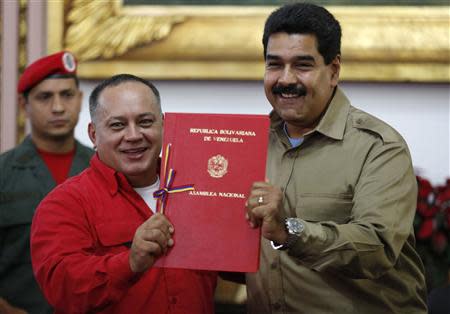Venezuela gives president decree powers for 'economic war'

By Brian Ellsworth and Daniel Wallis CARACAS (Reuters) - Venezuelan lawmakers granted President Nicolas Maduro yearlong decree powers on Tuesday that he says are essential to regulate the economy and stamp out corruption but adversaries view as a power grab. Hundreds of supporters of the ruling Socialist Party cheered outside the National Assembly as the so-called Enabling Law was passed, while a recording of Maduro's late predecessor, Hugo Chavez, singing Venezuela's anthem rang out inside the hall. The power to pass laws without congressional approval gives Maduro a political victory in the run-up to December 8 municipal elections, although he still faces a severely distorted economy with embarrassing product shortages and inflation surging to nearly 55 percent. "I want to thank the majority of patriotic and socialist lawmakers for approving this law that will let us advance, over the next 12 months, in defeating the economic war being waged against our people," Maduro said. "Tonight has been a victory for the people! ... Who says the revolution is over?" he added, flanked by ministers, to applause from a crowd outside the Miraflores presidential palace. The passage of the decree powers on Tuesday was widely expected and Chavez passed nearly 200 laws by decree during his time in office, including legislation that let him nationalize major oil projects and increase his influence in the Supreme Court. Maduro, 50, who is staking his rule on preserving Chavez's leftist legacy, says he has already planned the first two laws he will decree - maybe as soon as Wednesday. One is intended to limit businesses' profit margins to 15 percent to 30 percent as part of an "economic offensive" against price-gouging. Another would create a new state body to oversee dollar sales by Venezuela's currency control board. Diosdado Cabello, the head of the National Assembly and a staunch supporter of the president, said lawmakers had fulfilled an order by the late Chavez when they backed the legislation. "He told us to pass all the laws necessary to wring the necks of the speculators and money launderers," Cabello said. Maduro's original justification for decree powers was to toughen a crackdown on corruption, drawing skepticism from critics who say he zealously targets opposition officials while turning a blind eye to the worst of state-linked graft. "Why don't you punish people who have not complied with the (existing) laws? You want the Enabling Law to concentrate power," one opposition leader, Julio Borges, accused "Chavista" legislators during a charged debate ahead of the vote. "The reality is that the origin of this economic crisis is named Nicolas Maduro." BLACK BOX ACCOUNTING High-profile targets of the president's "war on corruption" have included an opposition advisor accused of running a transvestite prostitution ring and an opposition legislator stripped of parliamentary immunity for allegedly mismanaging a state-owned stadium. But the crusade has also toppled a high-profile Socialist Party mayor, executives from a China-financed state investment fund and the former head of a state-run iron mining firm. Opponents say Maduro should be chasing military generals and other senior officials they blame for turning Venezuela into a major supply route for Colombian drugs. The government denies that, saying narcotic seizures are on the rise. Critics also note Venezuela has for years refused to publish details of how it spends money held in state-run funds created during the Chavez era, even though required to by the country's main anti-corruption law, calling into question why he would need special anti-graft powers. Expenditures that do not require legislators' approval have grown so large that investors, such as those who hold Venezuelan bonds, struggle to quantify state spending and have to make their own calculations of the budget deficit. Government ministries have not responded to repeated requests over the last year seeking details of spending via off-budget mechanisms that include a fund called Fonden, which has received more than $100 billion. Maduro in the past two weeks has sent troops to occupy an electronics retailer and ordered thousands of businesses to slash prices, winning praise from supporters. Business groups say that risks worsening shortages in the months to come. "You can't beat inflation by decrees but with sensible economic policies," the opposition Democratic Unity coalition said in a statement, blaming government policies for economic problems and calling the Enabling Law a smokescreen. Prior to his crackdown on prices, several polls had shown a rise to about two-thirds in the number of Venezuelans pessimistic about the state of the nation. Maduro's approval rating has dropped from about 50 percent to the low 40s, two polls showed. (Additional reporting by Andrew Cawthorne, Diego Ore and Deisy Buitrago; Editing by Doina Chiacu and Lisa Shumaker)

